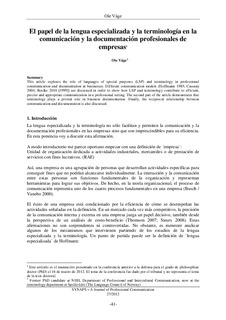| dc.contributor.author | Våge, Ole | |
| dc.date.accessioned | 2016-06-23T11:32:19Z | |
| dc.date.available | 2016-06-23T11:32:19Z | |
| dc.date.issued | 2012 | |
| dc.identifier.citation | SYNAPS - A Journal of Professional Communication 27(2012) | nb_NO |
| dc.identifier.issn | 1893-0506 | |
| dc.identifier.uri | http://hdl.handle.net/11250/2393875 | |
| dc.description | This article is in Spanish! | nb_NO |
| dc.description.abstract | This article explores the role of languages of special purposes (LSP) and terminology in professional communication and documentation in businesses. Different communication models (Hoffmann 1985; Cassany 2004; Roelke 2010 [1999]) are discussed in order to show how LSP and terminology contribute to efficient, precise and appropriate communication in a professional setting. The second part of the article demonstrates that terminology plays a pivotal role in business documentation. Finally, the reciprocal relationship between communication and documentation is also discussed. | nb_NO |
| dc.language.iso | spa | nb_NO |
| dc.publisher | NHH | nb_NO |
| dc.title | El papel de la lengua especializada y la terminología en la comunicación y la documentación profesionales de empresas | nb_NO |
| dc.type | Journal article | nb_NO |
| dc.source.pagenumber | 41-53 | nb_NO |
| dc.source.volume | 27 | nb_NO |
| dc.source.journal | SYNAPS - A Journal of Professional Communication | nb_NO |
